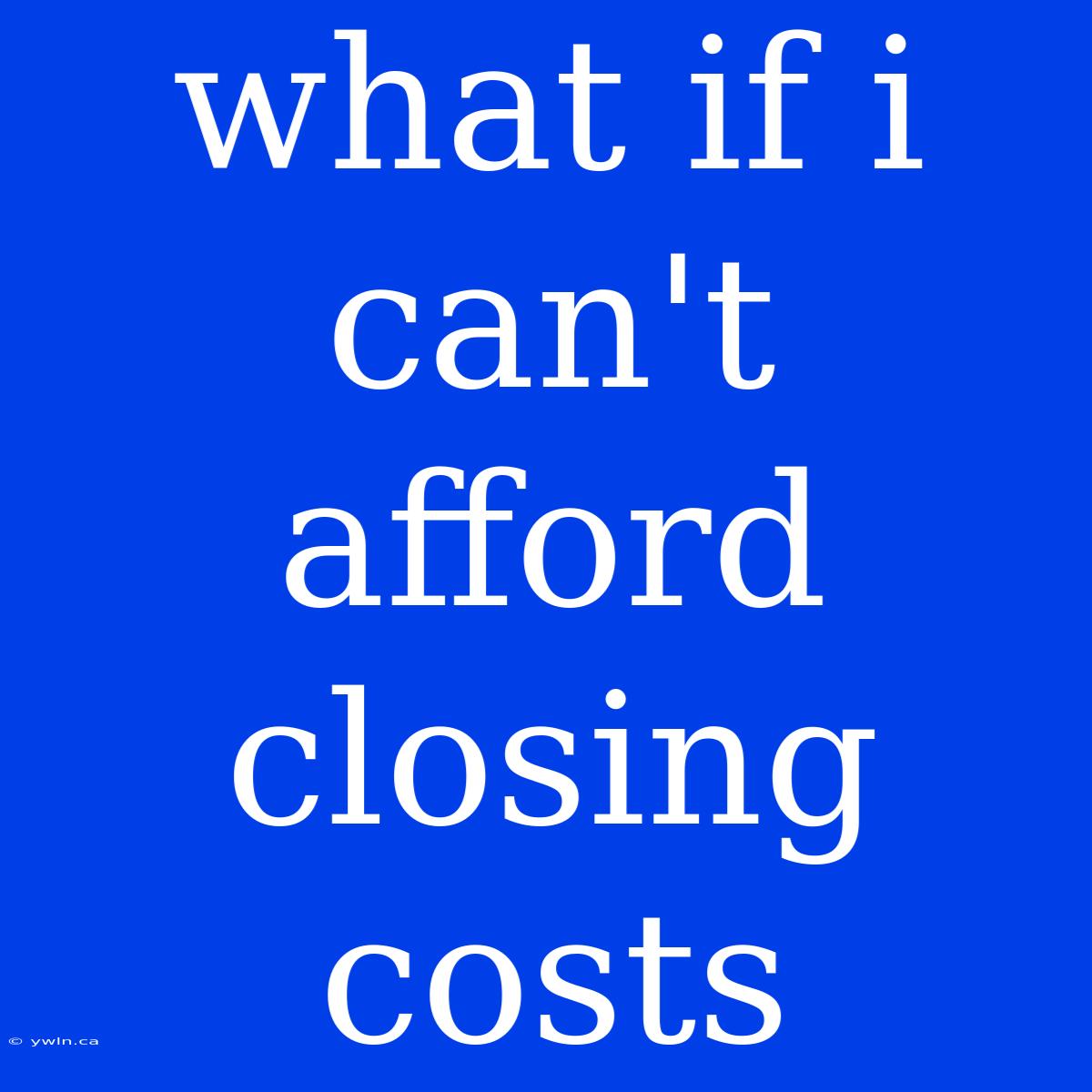What If I Can't Afford Closing Costs? Navigating the Hurdles of Homeownership
Hook: Buying a home is a dream for many, but the reality of closing costs can be a daunting obstacle. Closing costs are the expenses beyond the mortgage itself, and they can significantly impact your budget. What if you can't afford closing costs? Don't worry, you're not alone. Many aspiring homeowners face this challenge. This comprehensive guide explores the ins and outs of closing costs, helping you navigate this hurdle and realize your homeownership aspirations.
Editor Note: Closing costs are often overlooked, but they are a crucial aspect of the home buying process. Understanding them and planning accordingly is essential for a smooth transition.
Analysis: This article delves into the complexities of closing costs, analyzing their components, exploring alternative financing options, and providing actionable tips to manage this expense effectively. We have researched industry resources, consulted with real estate experts, and compiled this guide to empower prospective homeowners.
Key Takeaways:
| Key Takeaway | Description |
|---|---|
| Understanding Closing Costs | The various components of closing costs, including appraisal fees, title insurance, and loan origination fees. |
| Financing Options | Explore options like seller concessions, lender credits, and closing cost assistance programs. |
| Negotiating with Sellers | Learn how to approach sellers about contributing to closing costs. |
| Budgeting Strategies | Tips for effectively budgeting for closing costs, including saving strategies and prioritizing. |
Closing Costs: A Closer Look
Understanding the components of closing costs is crucial for effective planning.
Key Aspects:
- Appraisal Fee: The cost of hiring a professional to assess the property's value.
- Title Insurance: Protects you from claims against the property's title.
- Loan Origination Fee: A charge for processing your mortgage application.
- Property Taxes and Insurance: The first installment of these costs may be due at closing.
- Other Fees: Government recording fees, inspection fees, and legal fees.
Discussion:
The total closing cost can range from 2% to 5% of the purchase price, depending on the property's location, financing terms, and the specific services involved. These costs are often paid at the closing table, making them a significant financial commitment.
Financing Options for Closing Costs
Several financing options can help manage closing costs.
Point: Seller Concessions
Introduction: Sellers may be willing to cover a portion of your closing costs to make their property more appealing.
Facets:
- Negotiation: This is a negotiation point during the offer process.
- Benefits: Reduces your upfront costs.
- Risks: May result in a higher purchase price.
Summary: Seller concessions can provide a significant financial benefit, but it's essential to negotiate effectively and consider the potential impact on the overall purchase price.
Point: Lender Credits
Introduction: Some lenders may offer credits that can reduce closing costs, often as an incentive for choosing their services.
Facets:
- Types: Lender credits can be applied to various closing costs.
- Eligibility: Credit availability varies based on lender and loan type.
- Impact: Reduces the amount of cash needed at closing.
Summary: Lender credits can provide valuable assistance with closing costs, but it's essential to compare offers and understand the terms of the credit.
Point: Closing Cost Assistance Programs
Introduction: Various government and non-profit organizations offer programs that can help with closing costs.
Facets:
- Eligibility: Programs typically have specific eligibility requirements based on income, credit score, and other factors.
- Types of Assistance: Programs may offer grants, loans, or down payment assistance.
- Benefits: Reduce financial burden and make homeownership more accessible.
Summary: Exploring closing cost assistance programs can be a strategic step for first-time homebuyers or those with limited resources.
FAQs by Closing Costs:
Introduction: This section answers common questions about closing costs.
Questions:
- What are typical closing costs? Closing costs generally range from 2% to 5% of the purchase price.
- Are closing costs negotiable? Some closing costs are negotiable, including seller concessions and lender fees.
- Are closing costs tax deductible? Certain closing costs, such as points, may be deductible.
- What happens if I can't afford closing costs? Explore financing options, negotiate with sellers, or postpone your home purchase.
- Can I pay closing costs with a personal loan? While possible, it's generally not recommended due to potentially higher interest rates.
- How do I estimate closing costs? Your lender and real estate agent can provide an estimated closing cost statement.
Summary: Understanding these frequently asked questions can equip you with the knowledge to navigate the process effectively.
Tips for Managing Closing Costs:
Introduction: This section offers practical tips to manage closing costs effectively.
Tips:
- Start Saving Early: Begin budgeting for closing costs as soon as you start planning your home purchase.
- Shop Around for Lenders: Compare loan offers and closing cost estimates from multiple lenders.
- Negotiate with Sellers: Don't be afraid to ask sellers to contribute to closing costs.
- Explore Assistance Programs: Check your eligibility for local and national closing cost assistance programs.
- Consider a Homebuyer Education Course: Courses can provide valuable insights into managing closing costs.
Summary: By following these tips, you can increase your chances of successfully managing closing costs and achieving your homeownership goals.
Summary by Closing Costs:
Closing costs are a significant component of buying a home, and understanding them is crucial for financial preparedness. Explore financing options, negotiate with sellers, and prioritize budgeting to overcome the hurdle of closing costs.
Closing Message: Don't let closing costs deter you from pursuing your homeownership dream. With informed planning, strategic negotiation, and access to available resources, you can overcome this obstacle and confidently step into your new home.

